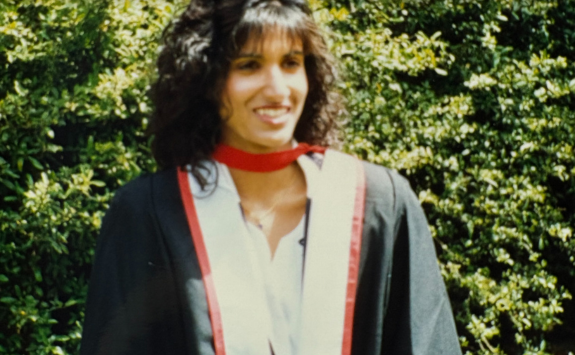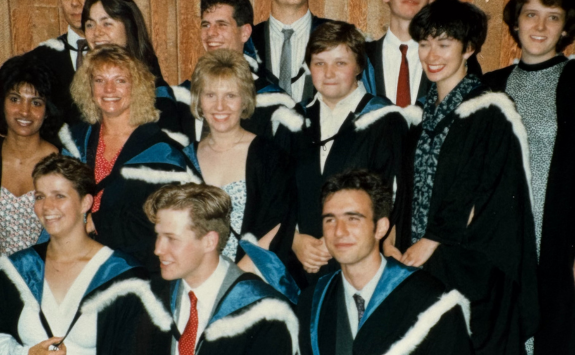Becoming a Fresher again 40 years after first arriving on campus
We recently caught up with Class of 1988 Microbiology graduate Dr Samina Hamilton to hear about her decision to return to campus this September to pursue an MA in Creative Writing.
3 November 2025
Inspired by her family history, and keen to share the unheard voices from her past with a new audience, Sam is seeking support from literary experts at Newcastle University to make her dream of becoming a published author a reality.
We recently spoke with Sam to find out what her time at Newcastle University was like the first time around – in the 1980s – where life took her following the completion of her PhD on campus, and what has brought her back to student life.

Concrete campus, The Carriage and chance encounters
I was 17 when I first arrived in Newcastle, having grown up in Yorkshire. I was a bit scared of the South, as it was an unknown quantity, so I was focused on looking at universities in the North. Back then, there wasn’t as much information available to you about what universities are like: you found out by hopping in the car and driving up with your dad!
Both my parents were doctors, so I was brought up being told that there were no careers outside of medicine and science! I studied microbiology in the new Medical School – the concrete end of campus rather than the historical beauty of King’s Walk – and lived in a small university hall that housed 18 of us. It was a beautiful townhouse on Eslington Road in Jesmond opposite The Carriage, so that’s where you would find us on Sunday nights!
I wasn’t involved in sports, but we had a fantastic nightlife. There was a really strong ‘going out’ culture back then. I became Social Sec of the Dunlop Society (Micro Soc) in my third year, and our committee brought in speakers, hosted ‘cheese and wines’, and fundraised, promoted and organised the annual ball, which capped off my final year perfectly. Mostly Friday nights were spent getting ready with a bottle of Concorde, then heading to Level 2 of the Union followed by Stage Door, sometimes with a pizza stop in between! We seemed to think far less than today’s students about careers and ‘what next’. It was a very freeing time.
I met my husband in my third year at the Students’ Union. He was from the ‘Poly’ (now Northumbria University) and I can’t remember if it was a joint event or if he’d just gate-crashed ours! We were watching Buddy Curtis and the Grasshoppers on Level 2 and – I’m quite short – he tapped me to ask, ‘Do you want a shoulder ride?’. I said, ‘go on then!’ and the rest, I suppose, is history!
Newcastle is one of those places where you fall in love with the place, and you just can’t leave.
Weighing up my options post-graduation
After my undergraduate degree, I was in a fortunate position where I had an unconditional offer to study medicine in London, a job offer as a microbiologist at ICI in Teesside, and an offer to stay on at Newcastle for a PhD with virologist, Ron Scott, who was a standout lecturer from my time at the university. It was Ron who embedded my lifelong love for virology and immunology.
In the end, I was exhausted from studying and desperate to earn some money, so I took the job at ICI. Within a year, I realised it wasn’t the environment for me, and I knew I wouldn’t be able to progress in science without further study. So back to Newcastle I came! I studied a PhD in gastrointestinal physiology, in the brand-new Gastrointestinal Drug Delivery Research lab run by Professor Barry Hirst, graduating in 1992. And just before I handed in my thesis, I married the guy from the SU gig!


Is there life outside academia?
After a couple of years post-doc’ing in virology under Ron Scott, it dawned on me that there was a life outside of academia. What followed was a career in clinical research (which is the commercial development of medicines) until I became pregnant with my son in 1998, which made the amount of travel involved in my job impossible. I’d always loved writing the manuscripts for publication in peer-reviewed journals for my company aside from my main role – and in fact, had enjoyed writing since school – so I transferred to the medical writing department. Making that move was like ‘coming home’ to what actually became my dream career.
I was essentially writing the documents that would facilitate the licensing of a medicine or vaccine. I used to lose myself in it, and over the years, have been a freelance consultant, worked for global corporations, right the way up the career ladder, and was even lucky enough to be appointed President of the European Medical Writers Association (EMWA). I have done a great deal of voluntary work with EMWA over the years to ensure we have well-educated professionals in place to bring medicines to patients – work for which I was appointed a Fellow of the Association in 2018.
And then came COVID. A lot of people saw the pandemic as a quiet time professionally, but not if you were managing the impact of the virus on every single clinical trial on the planet! Like so many others in my profession, I ended up putting in 90 hour-weeks for about nine months, which was professionally fulfilling but personally very challenging.
It’s important to share stories of families from different cultures adding value to our communities, to break down barriers and to challenge people’s insecurities.
A treasure trove of our family heritage
It’s fair to say that in the years after the pandemic, I was exhausted and thinking – what now? I needed to regain work-life balance…
Back in the early noughties, I interviewed family members and wrote up our history as a gift to the then young children in our family, ensuring that they could hear the life stories of Granny and Grandad first hand before it was too late. What I uncovered was a treasure trove of heritage and culture, stories that speak to a disappearing world but also resonate with the global issues that we’re seeing now.
After the pandemic, I began to revisit these family vignettes and felt like there was a story there that needed to be shared more widely. I think it’s important – particularly today – to share stories of families from different cultures adding value to our communities, to break down barriers and to challenge people’s insecurities. We’re the same under it all, after all.
The anecdote that stands out the most from my family research is one that revealed the contrasting upbringings of my parents, and how their shared passion for helping others brought them together. My maternal grandfather was the personal Private Secretary to Muhammad Ali Jinnah –the founding father of Pakistan. So my grandad was in the room as history was being written during the Partition of India. My Dad’s dad, on the other hand, saw his profession as a master tailor dissolve when the British Raj left India, leaving his family impoverished. But despite these contrasting childhoods, my parents met and fell in love at medical school, then moved to the UK in the 1960s to help build the NHS. It’s a story that makes me very proud.
Doing the story justice
I knew that I had a story worth telling, I just wasn’t sure where to begin! I joined a local writing group and began growing my network through the creative scene in Newcastle and applied to be an Emerging Creative Associate with New Writing North. This was a fantastic opportunity that connected me to acclaimed journalist and author Sheela Banerjee, who I had admired for many years. You could have knocked me down with a feather when she agreed to be my mentor!
During that time, I realised that the story should not just be about past generations: my kids are the age my parents were at when they first came to the UK, so the evolution of how we have lived over two generations is immense. There have been some comic moments – some darkly so – as we grew up in a changing Britain. All of that lends itself to novelisation, and I hope to have fun along the way as I learn how best to do that.
It's important to keep these stories and pass them on to show people that we're actually all the same.
There’s so much for me to put down from decades in the highly regulated world of scientific and medical writing, and to then learn a more fluid ‘show not tell’ approach to do these stories justice. So that’s how I’ve ended up back on campus 40 years later – a Fresher once more!
I can’t wait to have my mind stretched and learn from experts: the calibre of staff at the School of English Literature, Language and Linguistics (SELLL) is phenomenal. I am at a point in my career where it is hard to surprise me anymore. So, now, I’m dying to be surprised! I’m excited to get started and can’t wait to see where my story is in two years’ time when I graduate.
To follow Sam's MA Creative Writing journey week-by-week, follow @SamHamScribology on Instagram.
Do you have news to share with our alumni community?
Get in touch and share your latest news and achievements so we can let your fellow Newcastle alumni know!
